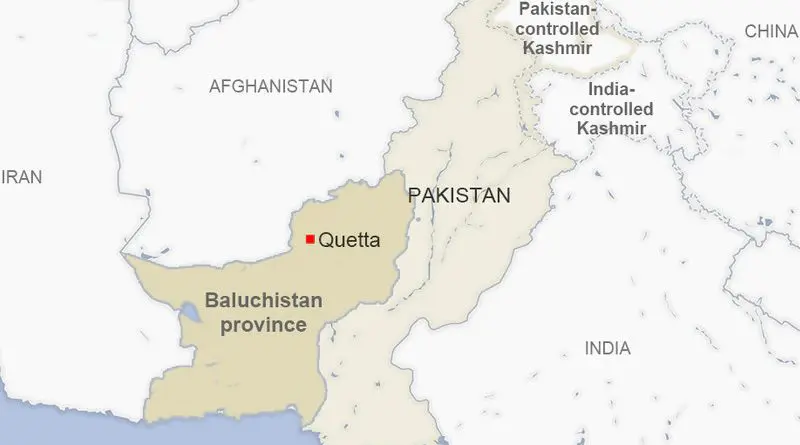Geostrategic Calculus Of Saudi Investments In Balochistan – OpEd
By Ameer Zaman
Saudi Arabia’s investment in Balochistan’s Reko Diq mining project and its planned oil refinery marks a crucial juncture in Pakistan’s economic and geopolitical trajectory.
The $540 million stake in Reko Diq and the $10 billion oil refinery are not merely financial ventures but represent a strategic realignment with long-term implications for Pakistan’s resource economy, employment generation, infrastructure development, and foreign relations. Despite these advantages, a concerted offensive media campaign has sought to malign these investments through disinformation and propaganda, primarily orchestrated by India’s intelligence apparatus and anti-Pakistan elements.
The investment in Reko Diq brings significant economic uplift, as it integrates Pakistan into global commodity markets while securing crucial capital inflows. With its reserves of 5.9 billion tonnes of ore containing an estimated 41.5 million ounces of gold, Reko Diq is a resource base of strategic importance. Saudi Arabia’s phased investment—$330 million for a 10% share, followed by $210 million for an additional 5%—positions it as a stakeholder in one of the world’s largest undeveloped copper-gold projects. The project’s economic dividends extend beyond revenue generation, fostering employment, infrastructure enhancement, and industrial synergies.
Yet, foreign investments in Balochistan have historically faced opposition, primarily through narratives of exploitation, environmental degradation, and exclusion of local communities. The hostile media campaign against Saudi investment follows this pattern. The orchestrated propaganda claims that these projects deprive Balochistan of its resources, despite the fact that the provincial government holds a 25% stake in Reko Diq, ensuring substantial revenue inflows into the local economy. The allegations of resource exploitation overlook the transparent contractual framework that guarantees equitable revenue distribution, reflecting improved governance mechanisms.
Environmental concerns form another facet of the disinformation campaign. Opponents argue that the large-scale mining operation will result in irreversible ecological damage, disrupting local ecosystems. However, Barrick Gold—the principal operator with a 50% share—has a long-standing reputation for implementing environmentally sustainable mining practices. Moreover, environmental impact assessments (EIA) are integral to the project’s execution, with stringent regulatory oversight to mitigate ecological damage.
A crucial element of the propaganda is the narrative of forced displacement and socio-political instability. Detractors falsely allege that local communities are being displaced without compensation, fueling separatist sentiments. This claim disregards the comprehensive resettlement and compensation frameworks in place, designed to uplift local livelihoods through direct employment and indirect economic benefits. Infrastructure development—such as roads, energy grids, and urban planning—further integrates Balochistan into the national economic framework, dismantling historical narratives of marginalization.
The Saudi investment in an oil refinery, which will process 300,000 barrels of crude oil daily, aligns with Pakistan’s broader energy security objectives. By reducing dependency on imported refined petroleum products, this initiative enhances economic resilience and stabilizes domestic fuel markets. The choice of location—either Gwadar or Hub—holds strategic merit, linking the project with CPEC’s logistical architecture and facilitating regional trade.
India’s intelligence agency, RAW, and other adversarial forces leverage digital platforms and international lobbying to distort these realities. The objective is clear: to sow distrust between Pakistan and Saudi Arabia, undermining strategic partnerships that strengthen Pakistan’s economic sovereignty. Propaganda tactics include drawing misleading comparisons to past failed projects to erode investor confidence. However, unlike previous initiatives, contemporary agreements are characterized by enhanced governance, contractual transparency, and stringent legal safeguards against undue exploitation.
Countering this offensive media campaign requires a multi-pronged approach. Pakistan must proactively engage in strategic communication, disseminating factual information through diplomatic channels, media outreach, and digital counter-narratives. Strengthening local stakeholder engagement by ensuring community participation in project governance can also nullify misinformation. Enhancing legal frameworks for investor protection will further consolidate foreign confidence in Pakistan’s investment climate.
In conclusion, Saudi Arabia’s investments in Balochistan are emblematic of a transformative economic partnership with Pakistan. The orchestrated disinformation campaign against these projects underscores the broader geopolitical contestations surrounding Pakistan’s economic resurgence. It is imperative for Pakistan to implement robust policy frameworks that not only protect these investments but also maximize their developmental potential for Balochistan’s long-term stability and prosperity. The economic and geopolitical ramifications of Saudi investments in Balochistan extend far beyond immediate fiscal gains. These projects have the potential to redefine regional economic integration, foster long-term development, and fortify Pakistan’s strategic alliances. The offensive media campaign against these investments is a calculated attempt to disrupt Pakistan’s economic trajectory. A robust counter-strategy anchored in transparency, strategic communication, and regional cooperation is imperative to safeguard national interests against external disinformation.

